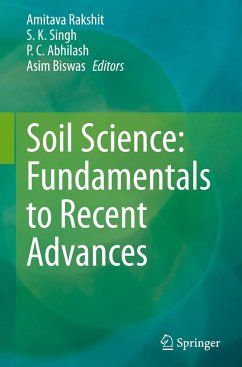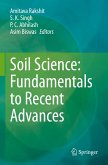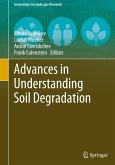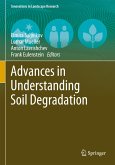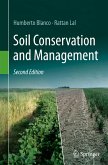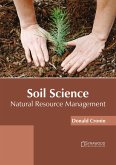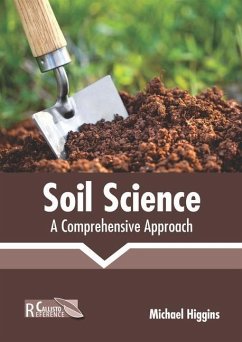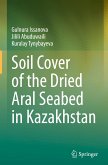Soil Science: Fundamentals to Recent Advances
Herausgegeben:Rakshit, Amitava; Singh, S.K; Abhilash, P.C.; Biswas, Asim
Soil Science: Fundamentals to Recent Advances
Herausgegeben:Rakshit, Amitava; Singh, S.K; Abhilash, P.C.; Biswas, Asim
- Gebundenes Buch
- Merkliste
- Auf die Merkliste
- Bewerten Bewerten
- Teilen
- Produkt teilen
- Produkterinnerung
- Produkterinnerung
This compilation has been designed to provide a comprehensive source of theoretical and practical update for scientists working in the broad field of soil science. The book explores all possible mechanisms and means to improve nutrient use efficiencies involving developing and testing of nanofertilizers, developing consortia based microbial formulations for mobilization of soil nutrients, and engineering of nutrient efficient crops using molecular biology and biotechnological tools. This is an all-inclusive collection of information about soil science. This book is of interest to teachers,…mehr
Andere Kunden interessierten sich auch für
![Soil Science: Fundamentals to Recent Advances Soil Science: Fundamentals to Recent Advances]() Soil Science: Fundamentals to Recent Advances161,99 €
Soil Science: Fundamentals to Recent Advances161,99 €![Advances in Understanding Soil Degradation Advances in Understanding Soil Degradation]() Advances in Understanding Soil Degradation205,99 €
Advances in Understanding Soil Degradation205,99 €![Advances in Understanding Soil Degradation Advances in Understanding Soil Degradation]() Advances in Understanding Soil Degradation147,99 €
Advances in Understanding Soil Degradation147,99 €![Soil Conservation and Management Soil Conservation and Management]() Humberto BlancoSoil Conservation and Management95,99 €
Humberto BlancoSoil Conservation and Management95,99 €![Soil Science: Natural Resource Management Soil Science: Natural Resource Management]() Soil Science: Natural Resource Management150,99 €
Soil Science: Natural Resource Management150,99 €![Soil Science: A Comprehensive Approach Soil Science: A Comprehensive Approach]() Soil Science: A Comprehensive Approach153,99 €
Soil Science: A Comprehensive Approach153,99 €![Soil Cover of the Dried Aral Seabed in Kazakhstan Soil Cover of the Dried Aral Seabed in Kazakhstan]() Gulnura IssanovaSoil Cover of the Dried Aral Seabed in Kazakhstan88,99 €
Gulnura IssanovaSoil Cover of the Dried Aral Seabed in Kazakhstan88,99 €-
-
-
This compilation has been designed to provide a comprehensive source of theoretical and practical update for scientists working in the broad field of soil science. The book explores all possible mechanisms and means to improve nutrient use efficiencies involving developing and testing of nanofertilizers, developing consortia based microbial formulations for mobilization of soil nutrients, and engineering of nutrient efficient crops using molecular biology and biotechnological tools. This is an all-inclusive collection of information about soil science. This book is of interest to teachers, researchers, soil scientists, capacity builders and policymakers. Also the book serves as additional reading material for undergraduate and graduate students of soil science, quantitative ecology, earth sciences, GIS and geodetic sciences, as well as geologists, geomorphologists, hydrologists and landscape ecology. National and international agriculture and soil scientists, policy makers will alsofind this to be a useful read.
Produktdetails
- Produktdetails
- Verlag: Springer / Springer Nature Singapore / Springer, Berlin
- Artikelnr. des Verlages: 978-981-16-0916-9
- 1st ed. 2021
- Seitenzahl: 924
- Erscheinungstermin: 3. August 2021
- Englisch
- Abmessung: 241mm x 160mm x 55mm
- Gewicht: 1531g
- ISBN-13: 9789811609169
- ISBN-10: 9811609160
- Artikelnr.: 61134342
- Verlag: Springer / Springer Nature Singapore / Springer, Berlin
- Artikelnr. des Verlages: 978-981-16-0916-9
- 1st ed. 2021
- Seitenzahl: 924
- Erscheinungstermin: 3. August 2021
- Englisch
- Abmessung: 241mm x 160mm x 55mm
- Gewicht: 1531g
- ISBN-13: 9789811609169
- ISBN-10: 9811609160
- Artikelnr.: 61134342
Amitava Rakshit, an IIT-Kharagpur alumnus is presently Associate Professor at the Department of Soil Science and Agricultural Chemistry at Institute of Agricultural Sciences, Banaras Hindu University(IAS, BHU). Dr. Rakshit worked in the Department of Agriculture, Government of West Bengal in administration and extension roles. He has visited Scandinavia, Europe, Africa, UAE and Bangladesh pertaining to his research work and presentation. He was awarded with TWAS Nxt Fellow (Italy), BiovisionNxt Fellow (France), Darwin Now Bursary(British Council),Young achiever award and Best Teacher's Award at UG and PG level(BHU-ICAR) and at state level by Uttar Pradesh Academy of Agricultural Sciences . He is serving as review college member of British Ecological Society, London since 2011, member of Global Forum on Food Security and Nutrition of FAO, Rome and Commission on Ecosystem Management of IUCN. He has published 105 research papers, 37 book chapters, 28 popular articles, three manuals and co authored twenty four books Dr.Satish Kumar Singh, received his B.Sc.(Ag) degree in 1985 and M.Sc.(Ag) in 1988 and Ph.D. in Soil Science and Agricultural Chemistry in 1992 from Banaras Hindu University, Varanasi. He started his professional career in 1990 as Lecturer of Agricultural Chemistry in Amar Singh (PG) College, Lakhaoti, Bulandshahr subsequently Dr Singh joined as Associate Professor in the year 1999 at G.B. Pant University of Agriculture and Technology, Pantnagar (Uttarakhand) and Professor, in 2006 at Banaras Hindu University, Varanasi. Prof. Singh is Fellow of Indian Society of Soil Science, New Delhi and Indian Society of Agricultural Chemists, Allahabad. He has guided 27 post graduate and 07 Ph.D. Students. He has more than 200 publications to his credit that includes Research Papers, Books, Book Chapters, Laboratory Manuals, Technical Bulletins, Technical Folders etc. Asim Biswas is an Associate Professor at the School of Environmental Science, University of Guelph, Canada. He is also an Adjunct Professor at the Department of Natural Resources Sciences, McGill University Canada, a Visiting Professor at Jiangxi University of Finance and Economics and Jiangsu University, China. His research program on sustainable soil management is focused on increasing the productivity and resilience of our land-based agri-food production systems in an environmentally sustainable way while accounting for changing climate, economy, and production methodologies. Currently, he runs a 21-member research team, funded by federal and provincial bodies as well as industries, grower's associations, and international organizations. He has authored and co-authored 113 peer-reviewed journal papers including 21 in review, 165 conference abstracts, 12 proceedings, 15 book chapters, 2 popular articles, edited a book, delivered radio and TV interviews, and granted a patent. He was invited to deliver keynote talks around the world and currently teaches multiple undergraduate, graduate, and special courses. Currently, he is an Associate Editor for 4 journals and a guest editor for another 4 journals. P. C. Abhilash is a senior Assistant Professor of Sustainability Science in the Institute of Environment and Sustainable Development (IESD) at Banaras Hindu University in Varanasi, India, and Lead of the Agroecosystem Specialist Group of IUCN-Commission on Ecosystem Management. He is a fellow of the National Academy of Agricultural Sciences, India. His research interest lies on sustainable biomass production from marginal and degraded lands for supporting a biobased economy, restoring degraded lands for regaining ecosystem services, land system management, sustainable utilisation of agrobiodiversity, nature-based solutions and ecosystem-based adaptations for climate-resilient and planet healthy food production, and sustainable agriscape management for food and nutritional security. He is particularly interested in sustainability analysis, system sustainability, sustainability indicators, circular economy principles, policy realignment and the localization of UN-SDGs for the sustainable development. He is sitting on the editorial board of prestigious journals in Ecology/Environment/Sustainability from leading international publishers, and also serving as a subject expert for UN-IPBES, IRP- UNEP, UNDP-BES Network, IPCC, UNCCD, APN, GLP, and IUCN Commissions (CEM, CEC, CEESP, and SSC) for fostering global sustainability
Chapter 1. Managing Soil Resources for Human Health and Environmental Sustainability.- Chapter 2. Soil Organic Carbon Dynamics, Stabilization and Environmental Implication.- Chapter 3. Soil Organic Carbon: Past, Present and Future Research.- Chapter 4. Below-ground carbon storage and dynamics.- Chapter 5. Soil Biodiversity and Community Composition for Ecosystem Services.- Chapter 6. Rhizodeposition: an Unseen Teaser of Nature and its Prospects in Nutrients Dynamics.- Chapter 7. Soil Indicators and Management Strategies for Agro-environmental Sustainability.- Chapter 8. Conservation agriculture in reshaping below ground microbial diversity.- Chapter 9. Saline and Sodic Ecosystems in the Changing World.- Chapter 10. Approaches in Advanced Soil Elemental Extractability: Catapulting Future Soil-Plant Nutrition Research.- Chapter 11. Liquid Biofertilizer: A Potential Tool Towards Sustainable Agriculture.- Chapter 12. Biochar Role in Mitigation of Greenhouse Gas Emissions from AgriculturalSoils.- Chapter 13. Nanotechnology is an Art for Native Nutrient Mobilization and Enhanced Use Efficiency.- Chapter 14. Nanotechnology in Environmental Soil Science.- Chapter 15. Importance of Soil Heterogeneity in Variety Testing Programs.- Chapter 16. Environmental and societal implications of soil response to increasing agricultural demands,- Chapter 17. Soil centric approaches towards climate resilient agriculture.- Chapter 18. Functional Diversity Management through Microbial Integrity for Sustainability.- Chapter 19. The Effect of Crops and Farming Systems on Soil Quality: A Case study.- Chapter 20. Role of Biochar on Greenhouse Gas Emissions and Carbon Sequestration in Soil: Opportunities for Mitigating Climate change.- Chapter 21. Employment of seed priming as a salt-stress mitigating approach in agriculture: challenges and opportunities.- Chapter 22. Microbial Approaches for Bio-Amelioration and Management of Salt Affected Soils.- Chapter 23. Role of zeolites in improving nutrient and water storage capacity of soil and their impact on overall soil quality and crop performance.- Chapter 24 Sulfur in Soil: Abiotic Stress Signaling, Transmission and Induced Physiological Responses in Plants.- Chapter 25. Reducing methane emission from lowland rice ecosystem.- Chapter 26. Potential and Risk of Nanotechnology Application in Agriculture vis-à-vis Nano micronutrient Fertilizers.- Chapter 27. Introduction to drone technology for natural resource management in agriculture.- Chapter 28. High-throughput estimation of soil nutrient and residue cover: a step towards precision agriculture.- Chapter 29. Global development in Soil Science Research: Agriculture Sensors and Technologies.- Chapter 30. Soil science research and development in Latin America and the Caribbean.- Chapter 31. The frontiers in soil science research: An African perspective.- Chapter 32. Improvement of Soil quality by solid waste recycling: A Global Perspective. Chapter 33. Nutrient SufficiencyRange of Soils and Plants in Singapore.- Chapter 34. Calcareous Oolitic Limestone Rockland Soils of the Bahamas: Some Physical, Chemical and Fertility Characteristics. Chapter 35. Consequences of anthropogenic disturbance on variation of soil properties and food security: An Asian story.- Chapter 36. Natural Resource Management and Conservation for Smallholder farming in India: Strategies and Challenges.- Chapter 37. Soil and Water Management in India: Challenges and Opportunities.- Chapter 38. Indian Fertiliser Policy: Retrospect and Prospect.- Chapter 39. Long Term Fertilizer Experiments in India: Achievements and Issues for Future Research.- Chapter 40. Micronutrient deficiency stress in soils of India: tackling it to alleviate hidden hunger.- Chapter 41. Pesticides pollution in soils and sediment in India: Status, impact and countermeasures.- Chapter 42. Climate-Smart Soil Management: Prospect and Challenges in Indian Scenario.
Chapter 1. Managing Soil Resources for Human Health and Environmental Sustainability.- Chapter 2. Soil Organic Carbon Dynamics, Stabilization and Environmental Implication.- Chapter 3. Soil Organic Carbon: Past, Present and Future Research.- Chapter 4. Below-ground carbon storage and dynamics.- Chapter 5. Soil Biodiversity and Community Composition for Ecosystem Services.- Chapter 6. Rhizodeposition: an Unseen Teaser of Nature and its Prospects in Nutrients Dynamics.- Chapter 7. Soil Indicators and Management Strategies for Agro-environmental Sustainability.- Chapter 8. Conservation agriculture in reshaping below ground microbial diversity.- Chapter 9. Saline and Sodic Ecosystems in the Changing World.- Chapter 10. Approaches in Advanced Soil Elemental Extractability: Catapulting Future Soil-Plant Nutrition Research.- Chapter 11. Liquid Biofertilizer: A Potential Tool Towards Sustainable Agriculture.- Chapter 12. Biochar Role in Mitigation of Greenhouse Gas Emissions from AgriculturalSoils.- Chapter 13. Nanotechnology is an Art for Native Nutrient Mobilization and Enhanced Use Efficiency.- Chapter 14. Nanotechnology in Environmental Soil Science.- Chapter 15. Importance of Soil Heterogeneity in Variety Testing Programs.- Chapter 16. Environmental and societal implications of soil response to increasing agricultural demands,- Chapter 17. Soil centric approaches towards climate resilient agriculture.- Chapter 18. Functional Diversity Management through Microbial Integrity for Sustainability.- Chapter 19. The Effect of Crops and Farming Systems on Soil Quality: A Case study.- Chapter 20. Role of Biochar on Greenhouse Gas Emissions and Carbon Sequestration in Soil: Opportunities for Mitigating Climate change.- Chapter 21. Employment of seed priming as a salt-stress mitigating approach in agriculture: challenges and opportunities.- Chapter 22. Microbial Approaches for Bio-Amelioration and Management of Salt Affected Soils.- Chapter 23. Role of zeolites in improving nutrient and water storage capacity of soil and their impact on overall soil quality and crop performance.- Chapter 24 Sulfur in Soil: Abiotic Stress Signaling, Transmission and Induced Physiological Responses in Plants.- Chapter 25. Reducing methane emission from lowland rice ecosystem.- Chapter 26. Potential and Risk of Nanotechnology Application in Agriculture vis-à-vis Nano micronutrient Fertilizers.- Chapter 27. Introduction to drone technology for natural resource management in agriculture.- Chapter 28. High-throughput estimation of soil nutrient and residue cover: a step towards precision agriculture.- Chapter 29. Global development in Soil Science Research: Agriculture Sensors and Technologies.- Chapter 30. Soil science research and development in Latin America and the Caribbean.- Chapter 31. The frontiers in soil science research: An African perspective.- Chapter 32. Improvement of Soil quality by solid waste recycling: A Global Perspective. Chapter 33. Nutrient SufficiencyRange of Soils and Plants in Singapore.- Chapter 34. Calcareous Oolitic Limestone Rockland Soils of the Bahamas: Some Physical, Chemical and Fertility Characteristics. Chapter 35. Consequences of anthropogenic disturbance on variation of soil properties and food security: An Asian story.- Chapter 36. Natural Resource Management and Conservation for Smallholder farming in India: Strategies and Challenges.- Chapter 37. Soil and Water Management in India: Challenges and Opportunities.- Chapter 38. Indian Fertiliser Policy: Retrospect and Prospect.- Chapter 39. Long Term Fertilizer Experiments in India: Achievements and Issues for Future Research.- Chapter 40. Micronutrient deficiency stress in soils of India: tackling it to alleviate hidden hunger.- Chapter 41. Pesticides pollution in soils and sediment in India: Status, impact and countermeasures.- Chapter 42. Climate-Smart Soil Management: Prospect and Challenges in Indian Scenario.

